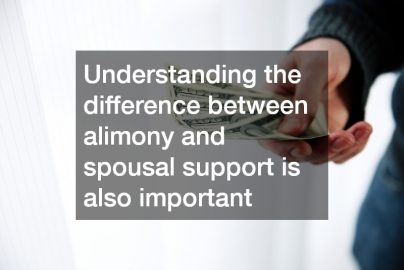Navigating the complexities of family law can be challenging, and having a local family law attorney to guide you through the process is invaluable. If you’re facing questions about alimony, it’s essential to understand how the laws apply to your situation. For example, if you get remarried does alimony stop? This is a common concern, and the answer can vary depending on the terms of your divorce agreement and the state you live in.
Understanding the difference between alimony and spousal support is also important. Many people wonder if alimony and spousal support are the same thing. In most cases, the terms are used interchangeably, but specific legal definitions can differ based on jurisdiction. Your attorney can clarify how these terms apply to your case. If your circumstances change, you might need to consider an alimony modification investigation. This process can determine whether adjustments to your payments are warranted, reflecting changes in income or financial needs.
Another important question is how long after divorce can you get alimony? The answer depends on various factors, including the length of the marriage and the financial situation of both parties. There are a number of factors that can differ from one case to the next and impact how these sorts of questions are answered. Consulting with a knowledgeable attorney can provide clarity and help you navigate these complex issues.
You don’t want to have to undergo the complicated process of a divorce by yourself, especially since there may be a lot of unfamiliar ground to cover. This means that it’s best for you to look for good divorce lawyers who can help you learn all the details that you need to know for a successful process. For instance, they can tell you what’s the difference between spousal support and alimony and many other details. They’ll answer questions that you may have, such as “at what age do you stop paying alimony?” and “can men get alimony?” By the end of your discussions with them, you’ll know exactly what you need to do and you’ll also have a good idea of what the outcome may be for you.
If you can find the time, do some research of your own as well, looking up phrases and processes so that you can have productive conversations with your attorney. You should also have a list of questions that you’d like clarified for you, including finding out the details of a divorce without alimony. If you can lessen this burden on the legal aspect, the whole process may be easier for you to navigate.

Alimony after remarriage can be a touchy subject for most people, which is why it’s important to enlist the help of a professional if you’re going through a divorce. Divorces can be a lot of work and take a lot of time and patience, as well as level-mindedness, so find a divorce lawyer with whom you’re comfortable working. A good lawyer should help you understand the whole process a lot better, answering questions such as “can alimony be decreased?” and “can I refuse to pay spousal support?”
There are a number of divorce lawyers in the industry, so you can choose to look for divorce lawyers for men. This could give you more confidence in the fact that you’ll be working with someone you’re assured of having your best interests at heart. You could also search for information online, looking for the answer to a question like “how long is temporary spousal support?” and more. As a result, you could have more constructive conversations with your lawyer and end up with an outcome that you’re happy with. Remember to keep an open mind while hoping for the best, because being mentally prepared can make it easier for you to go on with your life after the divorce.
The divorce process is difficult. They can range anywhere from a mutual agreement to a bitter and angry split. Depending on the situation, being served divorce papers can either be a relief or the most heartbreaking moment of your life. Almost half of all first marriages, and about 60 percent of second marriages, will end in divorce. About every 36 seconds a married couple gets divorced in America, which is over 875,000 per year. Divorce lawyers do their best to make the split as easy as possible for both parties, but sometimes it isn’t enough. Many people have a lot of legal questions about divorce that, unfortunately, they don’t get the answer to until it’s too late. These questions can be about alimony, the differences between an annulment and a divorce, and who will gain custody of a child when the divorce is over. There are no easy answers to some of these questions, but here are a few of the basics that may help.
1. What is an alimony?
Another term for alimony is “spousal support.” This is typically to provide the spouse that had lower income with extra money for living expenses. This only generally applies to cases where one spouse was making significantly more than the other, and will end either when the lower-income spouse becomes self-sufficient or remarries.
2. What’s the difference between a divorce and an annulment?
A divorce’s technical definition can be simplified as “a legal dissolution of marriage.” Basically, it ends the marriage legally. An annulment, on the other hand, is a complete erasure of a marriage, as though it never existed. The reasons for a divorce can vary, but an annulment needs more specific criteria to be allowed. These reasons typically vary state by state, but some apply almost nationwide, such as fraud or forced consent.
3. Who gets custody of the child?
This is a tricky question for many divorce lawyers, and there isn’t a simple answer. Over 1.5 million children go through their parents’ divorce each year. The question of custody is typically solved outside of court by the parents and their divorce lawyers, but if a mutual decision cannot be reached it will go to a family court. In this case, a judge determines the ultimate fate of the child. The main thing that judges consider in these cases is “what is in the child’s best interest?” One of the factors for this is which parent, if either, could be considered the “primary caretaker.”

Dealing with divorce is hard enough on its own if you are unaware of what the proceedings are all about and you do not have the right legal services. Some of the biggest concerns that come from divorce are custody agreements and alimony payments. When it comes to an alimony demand letter it is always best to take the time to use an alimony amount calculator and alimony based on income so that you can come to an agreement that works for everyone and that is going to be agreeable.
Taking the time to talk with a lawyer and find out what alimony and maintenance difference might be can also help you to figure out what payment you might need or be entitled to. With any sort of divorce or legal proceedings, the proper legal representation can make all the difference. Taking the time to ask the right questions, to really pay attention, and taking the time to be fully involved can make a big difference. Divorce is hard enough on its own and the right legal services can truly make a difference and can help you to get your proceedings underway and taken care of fully and with ease.
Divorce is one of the most stressful situations a family can go through. There are a lot of questions to ask a divorce attorney, and these only scratched the surface. It’s an in-depth, lengthy process that shouldn’t be taken lightly.

